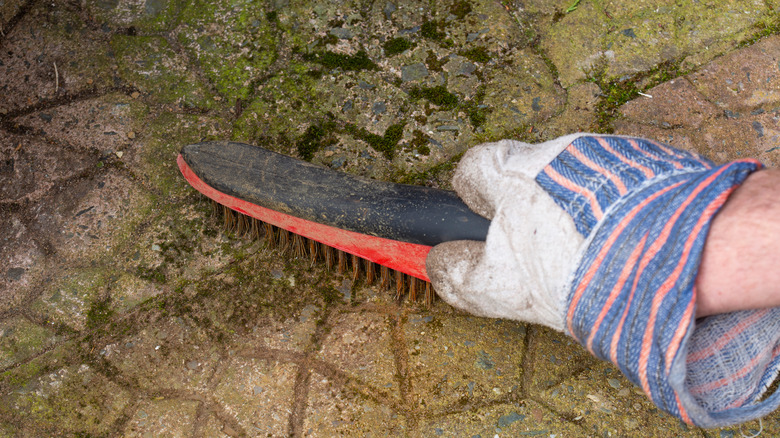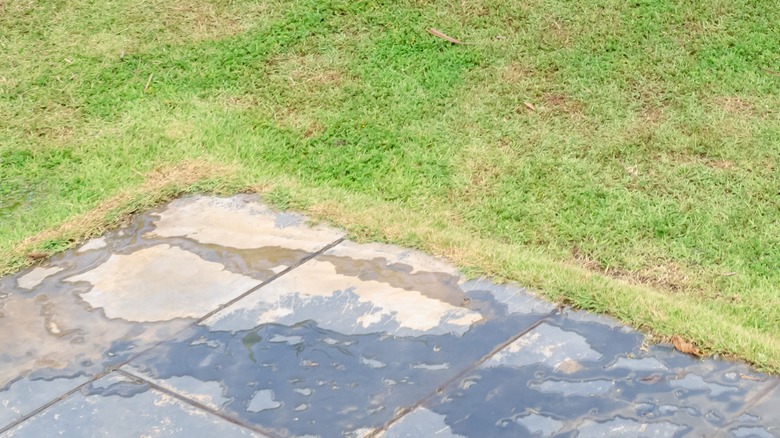Be Careful About Using This Cleaner On Your Patio Concrete
There are few things more relaxing than walking into a well-kept backyard, and keeping your patio looking spiffy is a big part of that. Moss-covered or metal furniture-stained pavers are seriously hard to look at for the yard-proud homeowner. You head to the local hardware store and grab the first paver cleaner you spot on the shelf or recommended to you by a staff member. Wait! You might be about to make a cleaning mistake that's destined to damage your patio. Before you splash it all over your patio, examine the contents. You've likely picked up brick acid, also known as muriatic acid or hydrochloric acid due to active ingredients within it. Once an industry-standard patio cleaner, most experts now agree that applying it to your beloved concrete courtyard will do more damage than good.
So, what is muriatic acid and how can it be used to clean your home? While it's commonly called muratic or brick acid, this solution is actually a chemical compound called hydrogen chloride (HCI) diluted in water at ratios of 36% to 38% HCI to water. You can buy it at hardware stores small and large and online. Some people turn to it to clean stains and efflorescence — those pesky white patches of calcium carbonate that appear on the surface over time — from their concrete pads and pavers. It works sort of like a skin exfoliant, dissolving just a bit of the surface of the brick or paver to reveal the clean material underneath.
Muriatic acid: Why it could be a concrete patio no-no
Muriatic acid is designed to clean durable clay bricks, hence the common name "brick acid," and thus, problems arise when it's used to clean other materials. Homeowners and professionals alike use it on outdoor concrete surfaces because it purportedly whitens or brightens them, and removes stains from paint, oil, rust, and mineral deposits. In many cases, however, the acid-cleaning process damages concrete rather than cleans it. Muriatic acid reacts with the calcium compounds and breaks down carefully balanced pH levels that bind concrete together. This weakens the material and irreparably pits the paver surface. Muriatic acid is also ineffective on surface coatings and oily and deep stains.
This strong acid cleaner also isn't that great for human health. Open the bottle or pour the further diluted solution out on some bricks and you'll notice a distinct smell — this off-gassing is dangerous to inhale, especially in high concentrations, according to the CDC. Splashing some of the liquid on your skin will cause chemical burns. And, just as muriatic acid is harmful to us humans, it's also not that great for garden plants and soil, nor your pets or any wildlife that happens to wander by while you're cleaning. The solution is bound to run off your patio as you work, killing any turf grass or plants in its path — sensitive greenery like roses and Japanese maple is particularly at risk — and wreaking havoc in nearby ponds and streams.
Take precautions when using muriatic acid on concrete
If you're hesitant to use muriatic acid in your concrete-covered backyard, we don't blame you. Thankfully, there are other, gentler cleaning options to explore, though using vinegar to clean your patio pavers could be a huge mistake, too. Unless your outdoor space is extremely dirty, you might do well to avoid acidic cleaners altogether. For example, bleach sits somewhere between vinegar and muriatic acid in terms of safety and harshness. Baking soda may work for spot-cleaning deep stains. Pressure washing alone, either DIY or commercial, is also an effective option.
Let's say, however, that all other cleaning options have failed and you want to give muriatic acid a go. First, suit up! Wearing personal protective gear, including gloves, a long-sleeved shirt, pants, closed shoes, eye protection, and a respirator, isn't negotiable when dealing with strong acid cleaners, even outdoors. Follow the manufacturer's dilution instructions — and application instructions, for that matter — to a tee: the solution can explode if improperly diluted and mixed. A weak 21:1 dilution ratio is a good starting point. Keep the area closed off from both human and furry family members and have a neutralizing agent (baking soda or lime) within grabbing distance. Tape off any surfaces you don't want the acid to damage (especially metal) and soak your lawn with the garden hose prior to application to minimize the effects of the run-off. Never use muriatic acid to clean singular stains, or you'll just end up with spotty concrete.

